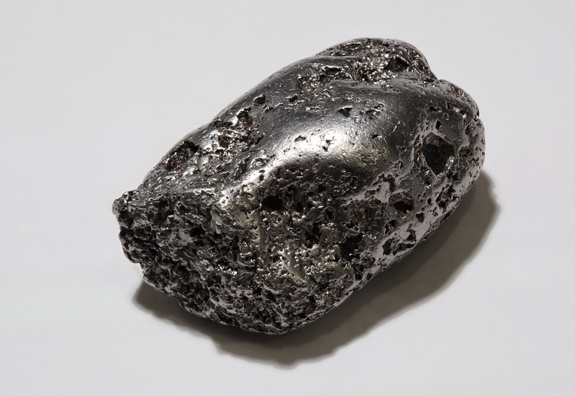Turning Iron Into Platinum: Easier—And More Useful—Than Turning Lead Into Gold
Chemical trickery causes iron to act like platinum

Platinum. Photo: Wikimedia Commons
Alchemists of old, including the renowned Sir Isaac Newton, toiled in vain to turn the mundane into the precious. Lead into gold, that was the goal. Over time, alchemy turned to chemistry, but the quest for transmutation was never truly abandoned. Writing in The New York Times, Hillary Rosner describes the work of one modern-day chemist who has successfully performed a bit of functional alchemy.
Paul Chirik of Princeton University, says Rosner, has not managed to turn iron into the precious metal platinum. But he has learned how to give iron a electronic mask, a clever chemical ruse that tricks other molecules into thinking the iron is platinum.
Platinum is quite valuable: it runs around $22,000 a pound. Along with other metals such as iridium or rhodium, Rosner explains, it’s used “to manufacture products from denim to beer, pharmaceuticals to fuel cells. The elements are used as catalysts, substances that kick off or enable chemical reactions.”
For any chemical reaction to work, the chemicals involved have to have enough energy to overcome a barrier known as the “activation energy.” Clever chemists figured out centuries ago, however, that by adding an extra chemical to the mix they could lower the activation energy of a chemical reaction. That process, known as catalysis, underpins a vast swath of modern society: it makes chemical processes that would be incredibly expensive or energy-consumin
Platinum catalysts, for instance, help make high-octane fuel, by turning one type of gasoline into another. They’re also found in catalytic converters, the expensive part of your car’s exhaust system that turns deadly carbon monoxide and nitrogen oxides into less dangerous gases.
The quest for a new generation of catalysts has been ongoing. According to Rosner, “Dr. Chirik’s chemistry essentially wraps an iron molecule in another, organic molecule called a ligand. The ligand alters the number of electrons available to form bonds,” the trick that makes other chemicals confuse iron for platinum.
With the high price of platinum and iron at just $0.50 per pound, Chirik’s pseudo-alchemy may be even better than the real thing.
More from Smithsonian.com:
Newton’s Vice
/https://tf-cmsv2-smithsonianmag-media.s3.amazonaws.com/accounts/headshot/smartnews-colin-schultz-240.jpg)
/https://tf-cmsv2-smithsonianmag-media.s3.amazonaws.com/accounts/headshot/smartnews-colin-schultz-240.jpg)